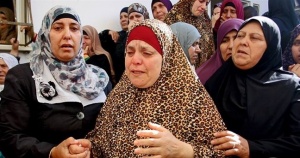- About
- News
-
Advocacy
- Accountability & Litigation
- International Advocacy
- National Advocacy
- Documentation
- FAI Unit
- Al-Haq Publications
- Library


- About
- News
-
Advocacy
- Accountability & Litigation
- International Advocacy
- National Advocacy
- Documentation
- FAI Unit
- Al-Haq Publications
- Library
According to information and evidence collected from the field, Al-Haq maintains that Muhammad Bassam 'Amasha, 25, and Anas Ibrahim Taha, 21, did not pose an imminent threat to the Israeli soldiers' lives at the time of their killing.
Timeline of Events:
On Monday 17 August 2015, Muhammad was shot dead with at least seven bullets by Israeli soldiers at the Za'tara checkpoint, south Nablus. Several witness statements collected by Al-Haq refute Israeli soldiers' claims that Muhammad was carrying a knife.
Jihad Khalil Hamayel, the paramedic who arrived to the scene to provide medical aid, asserts that he did not see a knife or any other weapon at the premise.

The next day, Israeli forces broke into and searched the 'Amasha's home in Kafr Ra'ee, Jenin. The forces interrogated Muhammad's father and uncle. One of the officers told the father that Muhammad was carrying a knife at the Za'tara checkpoint and that he attempted to stab a soldier. The officer also said that there are pictures showing Muhammad with a knife at the checkpoint. However, when Muhammad's father asked to see these pictures, the officer did not respond.
Another witness, Abdallah 'Awad 'Edeili, asserts that the soldiers shot at Muhammad from a distance before approaching him. In contrast, Israel claims that the soldiers at the checkpoint approached Muhammad and only shot him after he tried to attack them with a knife. It is likely that surveillance cameras near the located near where the incident took place recorded Muhammad’s killing. However, no videos have been released.
In a separate incident, on Sunday 9 August 2015 at approximately 8:00 pm, Anas stabbed an Israeli settler using a knife at Al-Khawaja gas station located at the 443 Road near Kharbatha Al-Mesbah, Ramallah. The settler fled after being injured.
According to Ali Nuzhi Al-Khawaja, an employee at the station, Anas remained at the gas station after stabbing the settler. Shortly after, two Israeli soldiers arrived from a nearby checkpoint and spoke to some workers in the restaurant attached to the station then left. Anas was still on the premises at the time, and he did not commit any other violent acts.
An Israeli military vehicle arrived to the scene later. The soldiers in the vehicle spoke to the restaurant's employees who pointed out Anas. The soldiers immediately stepped out of their vehicle and screamed at Anas in Hebrew. Anas, who was approximately 30 metres away from the soldiers, was squatting, holding the knife pointed towards the sky. Two soldiers shot two bullets in the air then a third soldier shot about five bullets in the direction of Anas. Notably, Anas remained in the same position during the warning shots and when bullets were shot in his direction. Israeli soldiers claim to have shot Anas to prevent him from escaping. According to the owner of the gas station, the soldiers confiscated the recording device from the gas station following the incident.
Conclusions:
- Since the beginning of 2015, 27 Palestinians have been shot and killed by Israeli forces in the OPT. Although the circumstances may vary, the majority of cases are a result of the excessive use of force by the Israeli Occupying Forces (IOF). International standards on the use of force affirm that firearms should only be used in limited cases, and guided by the principles of necessity and proportionality. Moreover, the “intentional lethal use of firearms may only be made when strictly unavoidable in order to protect life.”[1]
- In the aforementioned cases, neither Muhammad nor Anas posed an imminent threat to the lives of the soldiers around them at the time of their shooting. While it is still disputed whether Muhammad had a knife or initiated an attack at all, it is undeniable that both men could have been detained using less lethal means.
- Al-Haq calls on the Israeli occupying authorities to ensure a prompt, impartial and effective investigation into the death of Muhammad and Anas and to hold all perpetrators accountable. Accordingly, the surveillance videos should be released to the public to ensure transparency in the investigations. Al-Haq further calls on the international community to strongly condemn Israel’s policy of excessive use of force against Palestinians throughout the OPT, and take effective measures to ensure the protection of the occupied Palestinian population.
Basic Principles on the Use of Force and Firearms by Law Enforcement Officials, Adopted by the Eighth United Nations Congress on the Prevention of Crime and the Treatment of Offenders, Havana, Cuba, 27 August to 7 September 1990, http://www.ohchr.org/EN/ProfessionalInterest/Pages/UseOfForceAndFirearms.aspx
